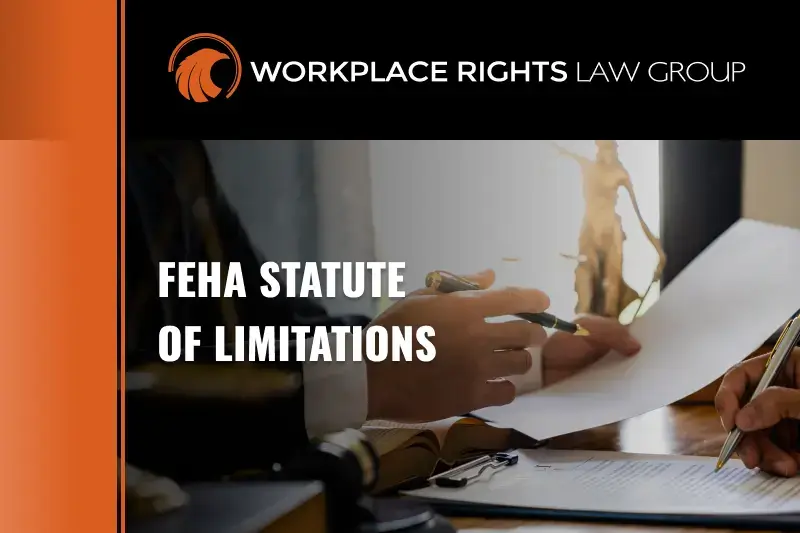
The California Fair Employment and Housing Act (FEHA) is the primary law that protects California employees from discrimination, retaliation, and harassment in the workplace.
If you have experienced any of these issues while employed in California, you may be eligible for relief.
California FEHA Regulations
The FEHA anti-discrimination provisions are applicable to any employer with five or more full- or part-time employees. Comparatively, the federal Americans with Disabilities Act (ADA) applies only to employers with a minimum of 15 employees.
More employers in California are subject to California anti-discrimination law than are subject to federal law. Therefore it is advisable for employees to pursue relief under the FEHA instead of the ADA.
FEHA Statute of Limitations
If you have experienced a violation of the FEHA, you have a limited amount of time to seek relief. A statute of limitations is a legal term defining the maximum time period that a party can wait to initiate legal proceedings from the time that the alleged offense occurred.
Under the Fair Employment and Housing Act (FEHA) in California, you must file a claim within three years of the alleged incident. This is a result of the recent passage of California Assembly Bill 9 (AB 9).
AB 9 Impact on FEHA Claims
As of January 1, 2020, AB 9 effectively amended Government Code 12960 and 12965 to state that all FEHA claims have a statute of limitations that extends to three years from the date of the discrimination, retaliation, or harassment. AB 9 only applies to FEHA claims that arise after the enactment date and does not retroactively include previous violations.
FEHA Claims Process
Despite the extended FEHA statute of limitations provided by AB 9, it is important to begin the FEHA claims process as soon as reasonably possible. Over time, supervisors and co-workers change and details become less clear. Important evidence or witnesses may be lost over time.
The California Department of Fair Employment and Housing (DFEH) oversees all FEHA claims and is where the process begins.
Filing a FEHA Claim
Your first step toward finding relief for your workplace dispute is to file a claim with the DFEH. The DFEH then has the opportunity to conduct its own investigation and determine if your claim is reasonable. The DFEH may attempt to resolve the dispute, take legal action, or dismiss the claim.
DFEH Investigation vs Right to Sue Letter
The DFEH investigation can take up to a year to complete. As a claimant, you can opt to allow the investigation or you can request a right to sue letter. The right to sue allows you to bypass the DFEH and proceed to file a lawsuit against your employer.
Generally, California employees who do not retain the help of an attorney choose the DFEH investigation, and those who have an attorney choose to request the right to sue.
Recovery FEHA Regulation Violation
The purpose of filing a FEHA claim is to receive both economic and non-economic compensation for the actions of your employer. Economic compensation should restore you back to the same place you would have been had it not been for the action of your employer.
Some potential awards may include:
- Recovery of lost wages;
- Reinstatement to your position;
- Recovery of employment benefits; and
- Attorney fees.
Non-economic damages address the hardships that cannot be defined by an account ledger or pay stub.
This may include compensation for things like:
- Emotional distress,
- Humiliation,
- Depression,
- Post-traumatic stress, and
- Anxiety.
Punitive damages may also be available. Punitive damages serve to deter and punish the employer from committing similar actions in the future.
Strengthening Your FEHA Claim
Despite the three-year FEHA statute of limitations provided by AB 9, it is important to act quickly. Waiting until the end of the FEHA statute of limitations period may prove detrimental to your case.
Not only could evidence be lost and relevant parties more difficult to track down, but your inaction may also imply that the employers unlawful actions towards you were not severe enough to constitute immediate action. That being said, taking time to process the occurrence is part of the reason for the AB 9 extension.
The best course of action is to consult an experienced California employment discrimination attorney who can evaluate your case and help you determine how you should proceed to receive the relief you deserve.
Workplace Rights Law Group has extensive experience with workplace discrimination and FEHA claims. Contact us online or call (818) 844-5200 to schedule your free consultation.
